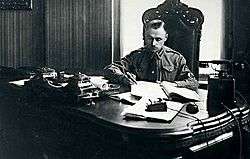Josef Grohé
| Josef Grohé | |
|---|---|
|
Grohé in Nazi uniform | |
| Gauleiter of Cologne | |
|
In office 1931–1945 | |
| Leader | Adolf Hitler |
| Reichskommissar for Belgium and Northern France | |
|
In office 19 July 1944 – December 1944 | |
| Appointed by | Adolf Hitler |
| Preceded by | none (position created) |
| Succeeded by | none |
| Personal details | |
| Born |
November 6, 1902 Gemünden im Hunsrück, German Empire |
| Died |
December 27, 1987 (aged 85) Köln, West Germany |
| Political party | NSDAP |
Josef Grohé (6 November 1902 – 27 December 1987), was a German Nazi Party official. He was the Gauleiter of Cologne and Reichskommissariat of Belgium and Northern France.
Background
Grohé was born in Gemünden im Hunsrück as the son of a shopkeeper.[1] He finished secondary school in 1919 and worked as a clerk in the hardware industry.[1]
Politics and official positions
Grohé was already active in anti-democratic and racist organizations as an adolescent. He joined the anti-Semitic Deutschvölkischer Schutz und Trutzbund and the Nazi Party in 1921.[1] He was co-founder of the Nazi organization in Cologne in 1922 and founder of its newspaper, the Westdeutscher Beobachter.[1] In 1931 he was appointed Gauleiter (regional party leader) of Cologne-Aachen, and in 1932 he was elected to both the Reichstag and the Prussian Staatsrat (State Council).[1]
In July 1944, in addition to these posts, he was made the Reichskommissar of the newly created civilian administration in German-occupied Belgium and Northern France.[1] From September 1944, however, the territory's liberation by the Allies begun. In 1945, he organized the Cologne Volkssturm and ordered the demolition of five large bridges over the Rhine.[1]
He was arrested by the British occupation authorities in Cologne in 1945 and imprisoned until 1950.[1]
Post-war
After the war, Grohé remained dedicated to the Nazi cause for the rest of his life and showed no remorse.[1] In 1950, he was sentenced to a four and a half years imprisonment (time served) by a court in Bielefeld for being a part of the political leadership of the Nazi party.[2] He had known of the Holocaust, but the court was not able to prove his involvement in atrocities.[2] After being released from imprisonment, he continued his professional career as a sales representative for German toy manufacturers.[2] He died on 27th of December 1987 in Brück, Cologne.[2]
Sources
Further reading
- Ernst Klee, Das Personen-lexikon zum Dritten Reich (Fischer Taschenbuch Verlag, Frankfurt-am-Main, 2005), 202
- Gauleiter: The Regional Leaders Of The Nazi Party And Their Deputies, 1925-1945 (Herbert Albreacht-H. Wilhelm Huttmann)-Volume 1 by Michael D. Miller and Andreas Schulz R. James Bender Publishing, 2012.
